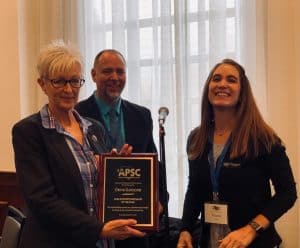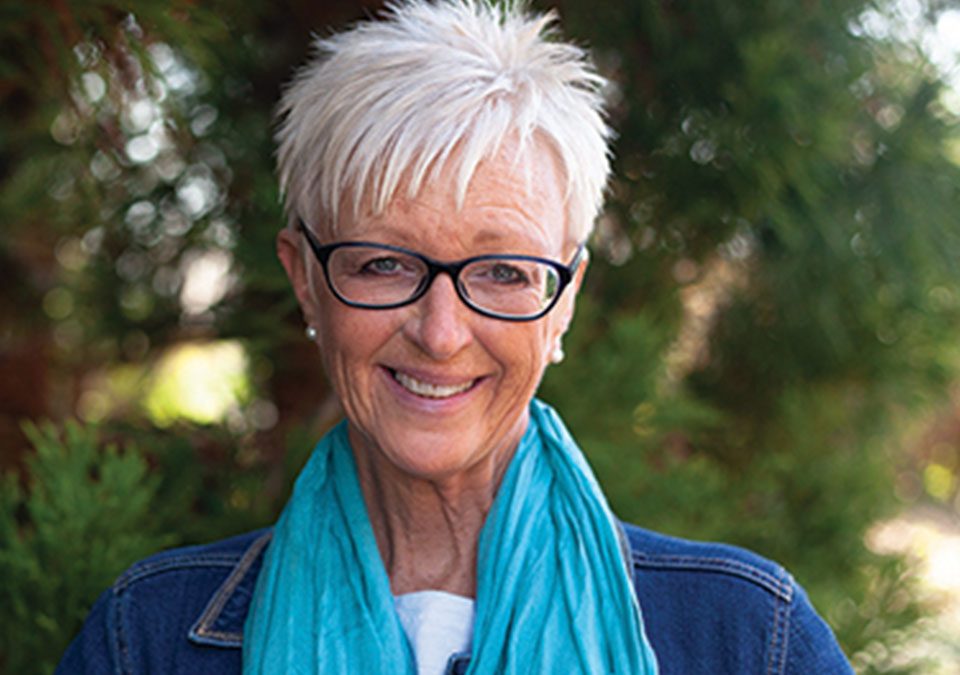
Dena and Moms Matter help moms thrive, and bring their kids home
My journey as a Peer Support Specialist into the world of Social Services was not straight forward or planned, like most of our journeys in recovery. I received my CPSS from DAODAS in February of 2015. I was considering working in sober living houses. I had an offer to help open a Women’s Recovery House and was building awareness for this venture in Greenville. I knew I didn’t want to work in the hospital or treatment facilities and wanted to be out in the world, but there was little awareness of the need for Recovery Coaches at the time. Sober living houses seemed to be the only game in town.

Dena receives the APSC Peer Support Specialist of the Year
In 2015 I met David White at a Chamber of Commerce event. David had started Fostering Great Ideas in 2011 and his passion and desire to walk with children navigating the foster care system was palpable. David wanted a program to support moms who have had their children removed from the home and asked me to put one together. Of course, I said I could do that. So, I did some research on foster care and fell back on what I know best. Recovery.
Annually, over 200,000 kids are taken into DSS custody, with the primary cause being neglect often associated with substance abuse, domestic violence, or mental health issues. Or all three, as we know how intertwined this becomes.
SC Child Welfare System’s mission statement includes the priority of reunification of families. How is this working out? In 2015 I had no idea. I do know the system is not a good parent. Case workers, supervisors, investigators are overworked, and probably underpaid. They are responsible for more children than there are days of the week and hours in a workday. They are overwhelmed, burned out and the turnover is annually over 25%. At the same time, I work alongside a lot of these men and women who have a huge heart for children, for families and for the successful reunification of both. They live for success stories and stability for all children. They grieve, they mourn, they deal with trauma and injustice and hopelessness and powerlessness just like the families do.
In October of 2015 I set up Moms Matter. I spent a couple months prior having meetings with Greenville county case workers to sell them on this idea and setting up a referral system. My spiel developed into something like this and it’s what I tell all professionals and my Moms when I meet them. “I am a person in long term recovery and what that means for me is I have not used drugs or alcohol in many years and because of that, I get to do amazing things like this that I would have never dreamed possible for my life. But because of my bad choices, I lost custody of my youngest son when he was four years old. I lost custody to his dad, not to DSS, but I never got him back. He is a grown man today and we have a relationship that we are still working on. Those are the consequences of my actions. I tell you this so that you know I am just like my Moms. I am one of you. I am a peer not a professional. I just want to walk alongside you as you go through this incredibly hard time. I want to help you prioritize and organize your treatment plan so that you can take your children home.”
I tell caseworkers that I am an added support and resource for their cases and I am. I tell Moms that the other Moms in Moms Matter can understand where they are at and give them tips and experience along the way. It is the first place in the DSS system where Moms feel safe, unjudged, and related to. They also get the unvarnished truth, zero tolerance for excuses, and the never-ending belief that they can change their lives and be the best place for their children.

My numbers are not high. But we in the addiction communities know how hard, hard data can be for us. What is success? How do you measure recovery? Not all of my Moms struggle with substance abuse, but they all struggle with trauma and trauma leads to all kinds of destructive behavior. They can and do recover, but women in trauma don’t trust, don’t ask for help, they hide their problems because their biggest fear is losing their kids. Then when they do, more trauma.
The stigma can be overwhelming which pushes women into fight or flight mode and neither is very attractive when dealing with DSS. I have to talk to 10 women to get 2 to show up for Moms Matter. What do they say in treatment facilities? “One in 10 of you will make it.” Same for me. In 2016, I had 5 women coming to Moms Matter on a regular basis. Most cases last anywhere from a best-case scenario of 6 months up to 2 years.
By 2018 I had 20 women in group. Of those 20 women, 13 stayed consistently and reunified with their children. Of those first 13 Moms, I am still in contact with 10 and with those 10, we have 19 children still at home. 10 families still together, 19 children with their Moms and all 10 Moms thriving.
This piece was originally published in the APSC Spring Newsletter, March 2022.
Learn more about Dena’s work or make a Moms Matter referral.



